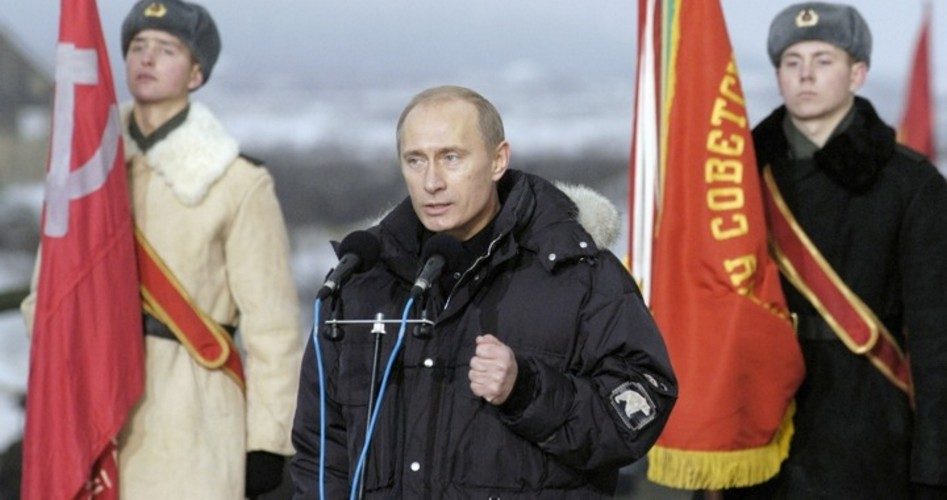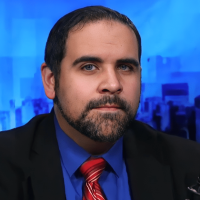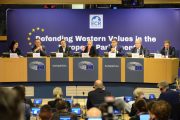
On August 17, a Moscow court found three young female performers from the Russian punk band Pussy Riot guilty of “hooliganism motivated by religious hatred.” The band members were sentenced to two years in a penal colony. The women, Nadezhda Tolokonnikova, Maria Alyokhina, and Ekaterina Samutsevich, were arrested in March following their February 21 performance, in which they sneaked onto the area in front of the iconostasis. In Eastern Orthodox Christianity, an iconostasis is an altar screen or wall of idols and religious paintings that separates the Sanctuary from the nave. The public is usually not permitted to enter this area. Here, the band performed what they called a “punk prayer,” in which they danced, jumped, and shouted lyrics such as, “Virgin Mary, Get Putin Out.” The performance lasted for about 40 seconds before they were escorted out. The band members did not vandalize the church or any of its property.
People in the church captured footage of the band’s “punk prayer” and posted the videos on social network sites, such as YouTube. The band’s arrest prompted worldwide condemnation, primarily from the West, which saw their arrest as yet another sign of Putin’s relentless crackdown against political opposition.
Victoria Nuland, a spokeswoman for the U.S. State Department, release the following statement, “We urge Russian authorities to review this case and ensure that the right to freedom of expression is upheld.”
White House spokesman Josh Earnest said, “The United States is disappointed by the verdict, including the disproportionate sentences that were granted.”
Hugh Williamson of Human Rights Watch said, “The charges and verdict against the Pussy Riot band members distort both the facts and the law. These women should never have been charged with a hate crime and should be released immediately.”
Music celebrities from around the world expressed their support for the punk band players. “I hope you can stay strong and believe that I and many others like me who believe in free speech will do everything in our power to support you and the idea of artistic freedom,” posted Paul McCartney on his Twitter page.
On paper, the Russian Constitution provides for the freedom of speech and assembly. Chapter 2, Article 29, subsection 1 states, “Everyone shall be guaranteed the freedom of ideas and speech.” Further down, Article 31 reads, “Citizens of the Russian Federation shall have the right to assemble peacefully, without weapons, hold rallies, meetings and demonstrations, marches and pickets.” However, as in the Soviet Union, where such rights were also “guaranteed,” Russia does not uphold these rights.
Despite the supposed constitutional protections, Judge Marina Syrova of Moscow’s Khamovnichesky District Court found the three young female performers guilty of “religious hatred,” under Article 213, Part 2 of Russia’s criminal code. Although the church forgave the performers, the judge offered little leniency. The maximum sentence for this alleged “hate crime” is seven years; they received a two-year sentence.
The arrest and subsequent guilty verdict have reignited fears of a return to the totalitarian conditions of the Soviet Union. “The situation with democracy is substantially worse than it was, say, 15 years ago. We are moving toward authoritarianism and totalitarianism,” said Ivan Preobrazhensky, a KGB/FSB defector, according to the New York Times. He explained that the court’s verdict was only the latest part in a series of actions taken by the Russian government to crush dissent since Vladimir Putin first came to power in March 2000. The denial of Pussy Riot’s constitutional right to free speech and assembly is not surprising in Putin’s Russia, especially when considering Putin’s past.
Putingrad
Putin joined the KGB in 1975. He was assigned to Dresden, East Germany in 1985, primarily dealing with the Red Army Faction, also known as the Baader-Meinhof Gang, which was a Marxist-Leninist terrorist group based in West Germany. In 1998, Russian President Boris Yeltsin appointed him as the head of the FSB, which became the primary successor to the KGB.
Putin served as the head of the FSB until 1999, when he became the first deputy prime minister of the Russian Federation. The following year, Putin became Russia’s president, and among his first presidential actions was the restoration of the old Soviet national anthem.
In 2005, Putin reinstituted government controls over Gazprom, the world’s largest extractor of natural gas and the largest oil company in Russia, which was originally created as a Soviet state company in 1989 and “privatized” during the 1990s. (Privatization in Russia mainly consisted of merely divvying up Russian enterprises between hardcore communists — often former KGB — and their cronies.) He is unrepentant about communist totalitarianism, saying in 2005, “First and foremost it is worth acknowledging that the demise of the Soviet Union was the greatest geopolitical catastrophe of the 20th century.”
Under Putin, licenses to independent newspaper and radio media outlets were suspended, while state persecutions and mysterious murders of journalists escalated.
One of the victims, Anna Politkovskaya, a well-known Russian journalist, author, and human rights activist, was found shot dead in the elevator of her apartment in Moscow in 2006. Politkovskaya was known for her opposition to Russia’s war in Chechnya and was an outspoken critic of Putin. In 2004, she authored the book Putin’s Russia: Life in a Failing Democracy, in which she accused Putin and the FSB of transforming Russia into a Soviet dictatorship. She wrote, “The KGB respects only the strong. The weak it devours. We of all people ought to know that.” Politkovskaya further wrote:
We are hurtling back into a Soviet abyss, into an information vacuum that spells death from our own ignorance. All we have left is the internet, where information is still freely available. For the rest, if you want to go on working as a journalist, it’s total servility to Putin. Otherwise, it can be death, the bullet, poison, or trial —whatever our special services, Putin’s guard dogs, see fit.
Before the FSB assassinated ex-KGB/FSB defector Alexander Litvinenko by radiation poisoning in 2006, he accused Putin of ordering Politkovskaya’s murder.
Another victim, Ivan Safronov, a Russian reporter, died in 2007 after mysteriously falling out of a window. At the time of his death, he was investigating the sale of weapons from Russia to Syria and Iran. Safronov told his newspaper Kommersant that he had “received information” about Russia’s sale of fighter jets and missiles to Iran “via Belarus to avoid the West accusing Russia of arming rogue states,” according to Kommersant.
Putin’s second term as president ended with the war in Georgia, the first Russian military invasion since the Soviet-Afghan War.
In adherence to Russian law, which allows the president to serve only two terms, in March 2012, he allowed himself to be demoted to prime minister, but only after choosing his successor. After his four-year self-demotion, Putin was elected president for a third term, a term that has been extended from four years to six.
Residents of Moscow often refer to their city as “Putingrad,” and his picture adorns the walls of many homes and businesses, as did those of Joseph Stalin during the early-mid 20th century.
Old Habits Die Hard
In fact, Russia has never disavowed communism, despite many claims to the contrary.
In a speech delivered on June 8, 1982, President Ronald Reagan predicted the march of freedom would “leave Marxism-Leninism on the ash-heap of history.” On June 12, 1987, while giving a speech at the Brandenburg Gate, in front of the Berlin Wall in West Germany, President Reagan called upon Soviet General-Secretary Mikhail Gorbachev to “tear down this wall.” Two years later a sea-change of events occurred, starting with the fall of the Berlin Wall and culminating with the dissolution of the Union of Soviet Socialist Republics (USSR), and the reunification of Germany. Excited and jubilant, many in the West observed those monumental events as a “collapse of communism.” This belief was propagated by U.S. officials. “Communism is dead,” declared Zbigniew Brzezinski, the former national security advisor to Jimmy Carter. “By the grace of God, America won the Cold War,” President George H. W. Bush triumphantly stated in his January 1992 State of the Union address.
But there are very few signals that would indicate communism’s demise in Russia.
At the end of World War II, no one doubted the defeat of Nazi Germany. Today, the swastika and the Nazi salute are illegal in Germany. In Austria, denying the Holocaust is also a crime, punishable by jail. Nazi emblems and swastikas no longer adorn Berlin. German troops and armored vehicles no longer parade in the streets. The Gestapo and SS no longer patrol the country. The Nazi Party has no representation in the Reichstag. Images of Adolf Hitler are not publicly displayed on the cover of notebooks or on the sides of public buses. But the same cannot be said of Russia and its past communist ties.
Soviet emblems and hammers and sickles still adorn the Kremlin. Russian troops, tanks, and nuclear intercontinental ballistic missiles continue to parade down Red Square. The Red Star remains a symbol of the Russian military. Moscow continues to align itself with other “Red,” or communist, countries around the world. And the Communist Party still has representation in the Russian Duma (parliament).
Russian Federation or Socialist Republic?
A communist country is identified as one with a one-party system ruled by the Communist Party. Although Russia is not officially ruled by the Communist Party, it is effectively ruled by communist partisans.
On June 12, 1990, the Congress of People’s Deputies of the Russian SFSR (Russian Soviet Federative Socialist Republic) ratified the Declaration of State Sovereignty of the Russian SFSR, effectively ending Russia’s membership in the Soviet Union and becoming an independent sovereign nation. On November 6, 1991, Russian President Boris Yeltsin made a decree banning both the Communist Party of the Soviet Union (CPSU) and the Communist Party of the Russian SFSR. In 1993, the Russian SFSR officially changed its name to the Russian Federation.
The general belief was that the Russian Federation was not a communist state, as were the People’s Republic of China, Cuba, Laos, Vietnam, and North Korea — the world’s only remaining “official” communist states. But that was soon proved wrong.
In 1992, a year after Yeltsin’s decree banning the CPSU, the Communist Party of the Soviet Union was restored at the 29th Congress of the Communist Party of the Soviet Union. The restored CPSU claimed to be the official successor to the original CPSU.
In 1993, the Union of Communist Parties–Communist Party of the Soviet Union (UCP-CPSU) was established as an international umbrella organization for all the official communist parties of the “former” Soviet republics. The stated objective of the UCP-CPSU is the restoration of the Soviet Union. The current general-secretary of the UCP-CPSU is Gennady Zyuganov, the leader of the Communist Party of the Russian Federation (CPRF). The CPRF remains one of the largest political parties in Russia, second only to Putin’s United Russia party, which is led by many “former” and current members of the FSB. Russian defector Konstantin Preobrazhensky stated that the United Russia Party “share[s] the same ideas” with the Communist Party.
United Russia was established in 2001 as an amalgamation of various political parties that merged in support of President Putin. Among the many parties that merged with United Russia, was the communist Agrarian Party of Russia, which had teamed up with the CPRF in 1996 to pass a law prohibiting individuals from buying or selling land. The merger of the various pro-Putin parties has transformed Russian democracy into a choice between Putin’s KGB/FSB-led United Russia and the Communist Party.
And these communists still largely act as communists.
Agriculture
Perhaps the most recognizable aspect of communist life in the Soviet Union was the collectivization of the peasants, through the creation of the kolkhoz (collective farms) and the sovkhov (state farms). In 1990, the Congress of People’s Deputies of the Russian SFSR passed the Law of Land Reform, in November, and the Law on Peasant Farms, in December. These laws along with subsequent laws and decrees allowed for the creation of non-state enterprises, known as joint-stock companies, and cooperative farms and also permitted the individual ownership of private farms.
On the surface it would appear as if these laws led to the very real privatization of land: “A few thousand state and collective farms still exist, although their number is much smaller than in the past because most large farms have reorganized into a variety of legal entities,” writes Stephen Wegren in his book Land Reform in Russia: Institutional Design and Behavioral Responses (2009). Stephen Wegren is a professor of political science and the director of International and Area Studies at Southern Methodist University, situated in the Dallas area.
But either in the form of joint-stock companies or agricultural production cooperatives, these new “legal entities” continue to operate in the same manner as the kolkhoz and sovkhov.
The old Soviet bosses still retain their hold over farms, even in the private sector. Of the privatized land, the majority is held by the successors of the Soviet collective farms. And though in March 1996, Russian President Boris Yeltsin issued a decree that would have allowed private farmers to buy and sell land, the following month the Duma passed legislation prohibiting individuals from buying or selling land. All land transactions are still managed by the state. This law was passed by the Agrarian Party of Russia and the Communist Party of the Russian Federation.
Obituary for Freedom
The more one examines Russia, the more one finds apt comparisons to the Soviet Union and a continuation of communism and harsh repression. The three Russian female punk rockers are perhaps coming to learn that lesson as they begin to carry out their two-year sentence.
Photo of Vladimir Putin: AP Images



